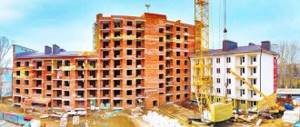From July 1, 2021, the Russian real estate market will undergo a total reboot. Shared construction in its current form, which has existed for 14 years, will be abolished, and developers will switch to project financing of objects.
How will these innovations affect ordinary customers? Should you rush to buy an apartment under the DDU? What are the development prospects for the real estate industry in the next 3-5 years? The answers to these and other questions are in a detailed analytical article from Avaho.ru.
Prerequisites for introducing a new financing model
Since December 30, 2004, when Federal Law No. 214 “On participation in shared construction” came into force, developers have had an effective financing mechanism at their disposal. It was as simple and convenient as possible for all participants in the process. Buyers could invest in real estate at the foundation pit stage and save, and developers could receive direct investment for the implementation of objects.
The main problem of shared-equity construction is the growing number of defrauded shareholders. According to RBC, in the first quarter of 2021 in Russia there are 842 problematic properties (1,261 houses), where 80.3 thousand private equity agreements were concluded by shareholders who were included in the register of victims. The number of problem houses is growing, despite the compensation measures taken.
The state's attempts to solve the problem over 14 years have not been successful. Then, in October 2021, Vladimir Putin instructed the relevant ministries to develop a three-year plan for abandoning shared-equity construction with a transition to new types of financing. During the “Direct Line” on June 7, 2021, the head of state announced the exact timing of the abolition of shared-equity construction - from July 1, 2021, it will be replaced by project financing.
Legal regulation in the field of shared-equity construction of real estate has been updated
11.07.2019
Estimated reading time: 5 minutes.
Natalia Stenina
Legal informs about the entry into force of a number of amendments to the Federal Law of December 30, 2004 No. 214-FZ on participation in shared-equity construction of apartment buildings and other real estate (hereinafter referred to as Law No. 214-FZ) and other regulatory legal acts[1]
.
We bring to your attention a brief overview of the main legislative innovations in the field of shared-equity construction.
1. The ban on raising funds from citizens in ways not provided for by Law No. 214-FZ is extended to non-residential premises
Before the introduction of these changes, the ban on raising funds from citizens in connection with the emergence of their ownership of real estate in ways not provided for by Law No. 214-FZ was established only in relation to residential premises in apartment buildings
[2].
From June 27, 2021, this ban has been extended to all premises (both residential and non-residential) in all real estate (both apartment buildings and other real estate)[3]. This regulation was introduced to establish requirements for developers of non-residential buildings that attract funds from citizens, similar to those that apply to developers of apartment buildings.
The changes made are aimed at limiting the possibility of developers circumventing the above prohibition by constructing “apartments” (non-residential premises)[4] instead of apartments (residential premises). In particular, apartment developers, as a general rule, will be required to use escrow accounts opened with an authorized bank to place funds received from participants in shared construction[5].
2. If it is impossible to complete construction, the amount of compensation paid to the affected participants in shared construction must be calculated taking into account the market value of the apartment on the date of payment of compensation
The regulation in force until June 27, 2021 provided that the amount of compensation paid to the public law fund (hereinafter referred to as the Fund) in the event of bankruptcy of the developer and the impossibility of completing construction was determined based on the market value of the square. m of equivalent residential premises during the period when the equity participation agreement (hereinafter referred to as the ESA) was concluded, and the calculation of compensation was carried out by the Federal State Statistics Service[6].
In accordance with the adopted amendments, the amount of compensation will be determined on the basis of the report of an appraiser hired by the Fund, based on the market price of equivalent residential premises on the date of payment of compensation[7]. The opportunity to receive compensation also became available to citizens who purchased non-residential premises or a parking space under the DDU. In these cases, the amount of compensation will be equal to the price in the DDU[8].
3. The possibility of switching to the use of escrow accounts for developers who are allowed to raise funds from participants in shared construction “according to the old scheme” without using escrow accounts
The developer, who was allowed to complete the construction of the property without using escrow accounts, is obliged to pay contributions to the compensation fund under the DDU, which provides for the transfer of residential premises[9]. Subject to this condition, he has the right to enter into such agreements. The developer’s fulfillment of this obligation is verified by the registration authority during the state registration of such DDU[10].
From June 27, 2021, if the developer does not want to pay contributions to the compensation fund, the developer has the right to switch to using escrow accounts. To do this, it is necessary to first make changes to the project declaration and post the changes in the Unified Housing Construction Information System. It is not allowed to use both options for attracting funds from participants in shared construction (partially concluding a joint agreement by paying contributions to the compensation fund, and partially using escrow accounts) simultaneously in relation to the same construction project.
4. A conclusion on the compliance of the developer and the project declaration with the requirements of Law No. 214-FZ is not required for registration of the DDU
From June 27, 2021, the specified conclusion of compliance is no longer required to be provided for state registration of DDU[11].
At the same time, obtaining this conclusion is still mandatory when raising funds from participants in shared construction for the construction of an apartment building
based on the DDU[12].
5. Refusal of conclusions on the compliance of the developer and the project declaration with the requirements of Law No. 214-FZ in relation to objects whose construction will be carried out using escrow accounts
As of June 28, 2021, the requirement to obtain
statements of compliance for developers raising funds using escrow accounts[13].
What to think about, what to do
In connection with the adoption of these changes, developers are recommended to familiarize themselves with the content of the adopted amendments and take them into account when planning and carrying out activities for the construction of real estate, financed from the funds of participants in shared construction.
Consultant help
Specialists are ready to provide developers with comprehensive legal support on any issues arising during the construction of real estate and raising funds from participants in shared construction.
[1] These changes were made by Federal Laws dated July 1, 2018 No. 175-FZ “On Amendments to the Federal Law “On Participation in Shared Construction of Apartment Buildings and Other Real Estate and on Amendments to Certain Legislative Acts of the Russian Federation” and certain legislative acts Russian Federation" and dated June 27, 2019 No. 151-FZ "On amendments to the Federal Law "On participation in shared construction of apartment buildings and other real estate and on amendments to certain legislative acts of the Russian Federation" and certain legislative acts of the Russian Federation."
[2] Part 2 art. 1 of Law No. 214-FZ (as amended before 07/01/2019).
[3] Subparagraph “a” of paragraph 1 of Art. 1 Federal Law No. 151-FZ.
[4] According to the legislation of the Russian Federation, all premises are divided into residential and non-residential. There is no definition of the term “apartment” in Russian legislation. “Apartments” usually mean non-residential premises that are built and purchased for the purpose of living in them.
[5] Clause 2, Part 1.2, Article 3 of Law No. 214-FZ.
[6] Part 2 of Article 13 of the Federal Law of July 29, 2017 No. 218-FZ “On a public law company for the protection of the rights of citizens - participants in shared construction in the event of insolvency (bankruptcy) of developers and on amendments to certain legislative acts of the Russian Federation.”
[7] Subparagraph “c” of paragraph 9 of Art. 13 of Federal Law No. 151-FZ.
[8] Subclause “d” of clause 9 of Art. 13 of Federal Law No. 151-FZ.
[9] Part 4 art. 3. Law No. 214-FZ.
[10] Part 3 art. 48 of the Federal Law of July 13, 2015 No. 218-FZ “On State Registration of Real Estate”.
[11] Subparagraph “a” of paragraph 2 of Art. 10 of Federal Law No. 151-FZ.
[12] Clause 2 of Art. 3 of Law No. 214-FZ. We would like to note that the developer’s attraction of funds from a citizen
, associated with the latter’s ownership rights to residential premises in
an apartment
building, in the absence of a conclusion on compliance, may lead to the developer being brought to administrative liability with a fine in the amount of 500 thousand to 1 million rubles. (Part 1 of Article 14.28 of the Code of the Russian Federation on Administrative Offences). This offense may also serve as a basis for criminal prosecution if it is committed on a large or especially large scale (Parts 1, 2 of Article 200.3 of the Criminal Code of the Russian Federation). The legislation also establishes a ban on placing advertisements related to raising funds from participants in shared construction in the absence of a conclusion on compliance (Part 8, Article 28 of the Federal Law of March 13, 2006 No. 38-FZ “On Advertising”). Failure to comply with this prohibition may result in administrative liability for violation of advertising legislation with the imposition of a fine on legal entities in the amount of 100 thousand to 500 thousand rubles. (Part 1 of Article 14.3 of the Code of Administrative Offenses of the Russian Federation).
[13] Subclause “e” of clause 8 of Art. 1 of Federal Law No. 151-FZ.
What is project financing
The new financing system implies the abandonment of the old DDU scheme and targeted lending to developers for each of the new buildings being implemented. When purchasing a home, the mandatory participation of three parties will be required: the buyer, the seller and the guarantor, which will be the bank.
The transaction will look like this:
- The buyer invests in the construction of housing.
- The bank accumulates funds in a separate special account.
- The developer receives a targeted loan from the bank for construction.
- After the object is put into operation, funds from the special account are transferred to the developer, and the housing becomes at the disposal of the buyer.
In accordance with the new model, citizens' funds raised for construction will be stored in escrow accounts. These are conditional special accounts that are opened before the occurrence of certain conditions, in a particular case - before the commissioning of the facility. Before this point, neither developers, nor banks, nor even the citizens themselves can manage money. To raise funds for construction, a developer can use his own finances or apply to a bank for a targeted loan issued at interest.
How to choose a developer: advice from a lawyer
So, how to choose a reliable developer taking into account changes in legislation in the summer of 2021?
- The developer must provide you with the entire package of documents for the project under construction, nothing has changed here. This includes rights to a land plot, construction permits, project documentation, charter, constituent documents, power of attorney for the developer’s representative;
- A reliable developer always has a website that contains detailed information about planned and already constructed objects;
- You are required to provide information about an open escrow account in a bank, into which you will need to deposit funds for the apartment purchased under the DDU;
- It’s worth searching the Internet for reviews from real investors;
- It’s definitely worth checking the developer using bailiff databases, court websites, and the tax office website.
Goals of transition to project financing
The shortcomings of 214-FZ were identified already in the first years of the law’s existence. Its provisions did not provide 100% protection of the rights of shareholders, and the number of deceived citizens gradually increased. To take countermeasures, a new body began to operate in the country on January 1, 2021 - the compensation fund for shared construction, which deals with compensation for damage when developers fail to fulfill their obligations. The funds received by the fund are accumulated from compulsory insurance contributions from developers.
Over the year of its existence, the created mechanism has shown its promise, however, government agencies have not changed their decision and still insist on the need to abandon the DDU.
The transition to project financing pursues the following goals:
- protecting the rights of home buyers;
- removal of unscrupulous and unreliable developers from the market;
- reduction of construction time.
According to the Minister of Construction and Housing and Communal Services Vladimir Yakushev, the new mechanism “will allow us to use the money of shareholders, but at the same time save it as much as possible, and not create the pyramids that we have today.” If it is now impossible to control the intended use of funds by developers, then in the future there will be some guarantee of their safety. Only large companies with a high degree of trust will be able to survive in the new conditions, and financial pressure in the form of paying interest on loans motivates developers not to delay the commissioning of projects.
What has changed in shared construction since 2020
The new regulations completely cancel the previous rules for shared construction.
From July 1, 2020 , the following changes apply.
- All objects under construction are transferred to escrow accounts. When executing an agreement with a shareholder, the developer registers an individual target escrow account. This account contains all the funds of the shareholder before the property is finally put into use. The banking organization blocks access to these funds for the entire period of construction work to prevent their unauthorized use.
- Individuals' funds are insured by the Fund for the Protection of Shareholders' Rights. This will prevent the loss of funds in the event of bankruptcy of a construction company or the banking organization itself.
- The developer must send design and engineering documents to the UISZhS.
- In order to obtain permission to build an apartment building, the developer must register a new legal entity and a target bank account, as well as obtain liability insurance. Without this, permission will not be issued to him.
- The developer has the right to carry out construction work on several sites at the same time only if he is engaged in the construction of a housing complex.
At the same time, a number of developers can sell apartments according to the previous scheme even after July 1, 2020. Objects must comply with legal requirements.
The development of the law on DDU took place in the following stages:
- from mid-2010, proposals to cancel shared-equity construction began to arise;
- after 5 years, experts developed a decision on the step-by-step abolition of DDU by the beginning of 2021;
- in 2021 it was announced that the DDU will be replaced by project financing of construction work;
- a year later, Putin gave a decree to abandon the DDU by July 1, 2020 and instead begin to practice civilized ways of buying housing;
- At the end of 2021, special amendments were made to the legislation, which developed updated norms and rules for shared construction for 2021.
As of March 1, 2020 , 4 large banks of the Russian Federation executed 55 agreements for financing in the amount of 34.1 billion rubles. More than 1,200 escrow accounts were opened.
22.04.2020 The Resolution came into force, which approved the criteria for the readiness of the building. If the developer complied with them, then he could use the shareholders’ money without opening escrow accounts. This resolution is aimed at ensuring the completion of construction of facilities in situations where completion of construction work is possible only according to the previous rules.
How will the transition to project financing take place?
The abrupt transition to a new system of construction financing is a new round of the crisis, which has been shaking the real estate market for many years. As President Vladimir Putin noted during the Direct Line on June 7, 2021, the transition must be carried out gradually, so the process will be divided into 2 stages, which will be implemented in 2021 and 2021, respectively.
Transitional phase (from July 1, 2021)
Along with amendments to the law on shared-equity construction, which came into force on July 1, 2021, the requirements for developers working under shared construction have become more stringent. At the same time, the protection of the rights of shareholders has been strengthened.
Main provisions of the amendment:
- introduction of escrow accounts;
- ban on housing certificates and housing cooperatives;
- mandatory banking support;
- 1 developer - 1 building permit.
The introduced amendments created a hybrid product that allows the use of DDU and at the same time contains elements of project financing to protect the rights of shareholders. In particular, from July 1, 2018, citizens’ funds raised for construction will be stored in escrow accounts until the facility is put into operation. This scheme will be applied on a voluntary basis throughout the year.
The ban on attracting investments through housing certificates and the creation of housing construction cooperatives (HBCs) is another protective measure, since such schemes do not give shareholders practically any guarantees when purchasing housing.
In addition, it was decided to limit developers in the volume of housing sales - now each company is issued only one construction permit. To prevent developers from circumventing this rule by creating new legal entities to obtain additional permits, the requirements for companies have been tightened.
Final transition to project financing (from July 1, 2019)
From now on, housing financing throughout Russia will be carried out using credit funds or using the developers’ own money. The remaining new buildings, for which they received permission before July 1, 2021, will continue to sell housing according to the old rules, but new projects with a similar financing scheme will no longer appear.
Escrow accounts
Perhaps the most significant change in the construction of multi-apartment residential buildings was the transition of developers to escrow accounts from July 1, 2021.
This was eagerly awaited as a turning point in the new buildings market. The change caused a lot of discussion both from the media and from developers. Of course, buyers greeted the innovations with hope and concern. That's why new home sales have skyrocketed since the start of 2021. The same thing happened with apartment prices. In order to continue working according to the old scheme, developers had to ensure that by July 1, the readiness of objects was at least 30% (when developing a microdistrict - from 15%) and the sale of 10% of housing under the DDU.
How do transactions with escrow accounts work?
Main events and trends in the Moscow housing market – 2019
According to Rosreestr, the number of registered childcare centers increased by a quarter in the first half of 2021 compared to the same period last year. In the second half of the year there is a decline. In October, the number of applications for preschool registration was comparable to the figures for 2018. However, this was to be expected.
Consequences of the transition to a new financing model
To solve the problem of unscrupulous developers, the state decided to take the simplest route. No shared construction means no defrauded shareholders. However, such logic does not work well in relation to such a complex structure as the Russian real estate market. Such radical changes in the structure of the real estate market can lead to unpredictable consequences.
What happens after switching to project financing:
- introduction of escrow accounts;
- buyers will not be able to buy cheap housing at the foundation pit stage;
- the cost of real estate will increase;
- the number of developers on the market will decrease.
The main advantage of shared construction for buyers is the opportunity to invest in real estate at the initial stages of development and thus save up to 30% of its initial cost. When the new rules of the game come into force, citizens will still be able to invest at the foundation pit stage, but they will no longer be able to receive benefits from this. Developers will build a pricing policy based on the future
the cost of finished housing, not the current one.
The transition to project financing deprives developers of the “easy money” that they previously received from equity holders in the form of direct investments. To find funds for construction, firms will be forced to turn to banks for large loans, on which they will have to pay interest - and this will lead to a decrease in profitability.
Banks, in turn, will tighten requirements for developers. Lenders are wary of long-term projects, and therefore will cooperate primarily with large companies. It will be difficult for start-up companies to obtain approval, since targeted loans require the preparation of a detailed project. The introduction of a new mechanism will inevitably lead to the bankruptcy of a number of small developers who will not be able to adapt to the new conditions.
Will the cost of housing change?
Experts have expressed concerns that the latest innovations will negatively affect the cost of housing for buyers. The lack of sales at the foundation pit stage will naturally lead to an increase in the cost of 1 sq. m. m.
After the reform, construction firms will face significant costs that will affect housing prices. This is due to the following reasons.
- The developer will have to obtain a bank loan or use the help of investors. Construction companies are deprived of the opportunity to use free money from shareholders. Banking organizations offer developers paid account services; money for construction is allocated at interest.
- Each construction company is required to transfer from 1-1.2% of the project cost to the Developers Compensation Fund.
- The amount of authorized capital depends on the area of the planned facility.
According to experts, the costs of developers will increase by a third . In order to get rid of part of the costs, firms will pass them on to buyers, increasing the cost of apartments.
There is no specific price forecast. The minimum increase in prices for new buildings will be 10%, as apartments will begin to be sold in already completed residential buildings. Many people will lose the opportunity to purchase apartments due to increased prices.
At the same time, there will not be a sharp increase in value in the next few months. If the company received a construction permit before July 1, 2018 , then the construction of the house will be carried out according to the same rules and conditions, and the cost of the apartments will remain the same.
Cancellation of shared construction in 2021
As of July 1, 2020, DDUs are no longer concluded. In our country, the usual model of investing individuals’ funds in construction work has been abolished. This is necessary to solve problems with fraud by construction companies and to prevent fraud among construction participants. Registration of escrow accounts and processing of bank loans, strengthening control over the construction industry by legislation - all this protects the property rights of citizens.
How much will prices in new buildings rise?
This is perhaps one of the most pressing issues that concern citizens. But it is impossible to give an unambiguous answer to this - it is still unclear how the scheme will work in general, and how developers will behave under conditions of severe pressure.
On the one hand, the cost of projects will definitely increase. Project financing places the burden of servicing loans on the shoulders of developers. The new law puts the developer in approximately the same position as ordinary citizens buying housing with a mortgage - based on standard rates of 10-10.5%, for 3 years of the production cycle they will have to overpay up to 30% of the loan amount. It is quite logical that the easiest way to “get rid” of this burden in such a situation is to raise the market price.
However, according to Oleg Repchenko, head of the analytical company, developers are unlikely to be able to shift loan servicing to home buyers. This conclusion was made as a result of forecasting the situation in the real estate market for the period 2018-2024.
Conditions that make it unlikely that house prices will rise in the coming years:
- overstocking of new buildings;
- reduced purchasing power of the population;
- uncertainty in the new buildings market.
Since 2021, the Russian real estate market has been experiencing a period of crisis and severe overstocking. In 2021, the supply volume amounted to 7.5 million sq. m. m of housing, whereas in 2011-2013. - about 4-5 million sq. m. The number of new projects in Moscow, St. Petersburg and throughout the country will continue to grow, until July 1, 2021. Developers are in a hurry to build as many objects as possible “according to the old rules,” and, without realizing it, they are further aggravating your position.
An increase in supply provokes a decrease in demand, which is also fueled by the fact that citizens simply do not have enough money to buy housing. This refers to segments of the population with incomes of 30-50 thousand rubles. per month - they are now the target audience for developers.
If we also take into account that a stable platform for organizing construction and financing according to the new rules has not yet been prepared, the first few years of the transaction will be concluded with a high degree of risk for all its participants. A sharp increase in real estate prices can simply bring down an already unstable market.
As follows from the data of the information portal irn.ru, reflecting fluctuations in the housing price index in Moscow, since 2021 there has been a decrease in the value of real estate. Both budget new buildings and luxury residential complexes are taken into account. The main factors that led to the decline of the market are the general weakening of the national currency and the decline in the purchasing power of the population. On average, housing prices have dropped by 25-30% since 2021 compared to pre-crisis levels. 2021 saw a period of relative stagnation.
In connection with recent events, 2021 will be a period of uncertainty for the market - it is difficult to make any forecasts, since the state applies both regulatory leverage and relaxing sanctions. A significant increase in prices under such circumstances is a very risky step for developers.
A more realistic scenario is a reduction in supply volumes. Developers are tied hand and foot by the latest amendments to 214-FZ, as a result of which they will begin to take a more selective approach to the sale of objects and the injection of funds. Meanwhile, in the future, they will still wait for a favorable moment to increase housing prices.
What are the forecasts for 2018-2024?
The most likely course of events in the period from 2021 to 2024. inclusive - this is a gradual decrease in supply with a gradual increase in prices, but within reasonable limits. The volume of supply that is already on the market will be enough to minimize the impact on buyers’ wallets.
In general, a decline in housing prices in large cities and throughout the country will be observed for another 1.5 to 2 years. The cost of real estate will fall to the “bottom” approximately in 2021, when the market is overwhelmed by a wave of “shared housing” that appeared during the rush of 2021. After this, most likely, another 2-3 years of stagnation and adaptation to new market conditions will follow. After this, market participants will act according to circumstances.
Is it worth buying a home in 2018-2019?
The era of 214-FZ is inevitably approaching its logical conclusion, but the question still remains whether it is worth “chasing the crane” and buying housing under the DDU in 2021, while it is still possible. Let's try to figure out what advantages this transaction format can provide.
Since the main purpose of project financing is to protect the rights of home buyers, it would be logical to assume that this format of the transaction is more reliable than the RDU. However, if shared construction has already existed for 14 years, along with all the judicial experience accumulated over these years, then the new scheme will be “tested” for at least another 3-5 years. In the early years, resolving conflict issues will be a labor-intensive process. In this respect, DDU clearly outperforms project financing.
The equity participation agreement, even in the form it will be in the period 2018-2019, still remains a relatively profitable investment mechanism, while project financing excludes this possibility. Moreover, in the latter case, there is no point at all in investing in the project in advance - only if you need to get a guarantee that a certain lot will be reserved for the buyer. But is the gamble worth the candle if you can simply put money in a bank at interest, wait a few years and buy a ready-made home?
In the case of a mortgage with a small down payment, the situation is even more complicated, since the state has been promising to reduce the loan rate to 6-7% for 9 years. In the new conditions, it is impossible to predict whether it is more profitable to apply for a loan now or wait for the promised relief. With the prospect of rising housing prices, lowering the key rate may become perhaps the only way to make housing in Russia more affordable.
Advantages and disadvantages of project financing
The construction reform in Russia has a good purpose, but may well only worsen the situation in the real estate market. The effect of protecting shareholders, which the authorities hope to achieve, will occur no earlier than in 3-5 years. Roughly speaking, this is to protect “future buyers”, while it is completely unclear what action will be taken in relation to those who purchase a home in the early years of the new scheme.
- Starting from 2021, the purchase of housing under construction will turn from an investment into a banal booking. By depositing money into an escrow account, citizens simply confirm their intention to purchase a specific lot. At the same time, the funds in the special account are inactive - they cannot be involved in any banking operations and neither the developer, nor the buyer, nor banks can make a profit. This is not a deposit, but simply a “frozen” fixed amount, which inflation “eats” over 2-3 years of the production cycle.
- It is unclear who and how will oversee compliance with the rights of home buyers. Banks, in accordance with the new law, act only as a guarantor of the safety of money in escrow accounts - it is not in their interests to act as a control body and regulate construction, this is the job of the Ministry of Construction.
- Project financing complicates the entry of new developers into the market and complicates the activities of existing ones. If a company does not have experience in cooperation with credit institutions, it will be difficult for it to understand all the nuances of the process and predict financial losses.
- Banks will most likely tighten requirements for companies, since financing a construction project is associated with high risks for a lender. In general, the transition to project financing is a big shock for all market participants, from developers to ordinary buyers.






